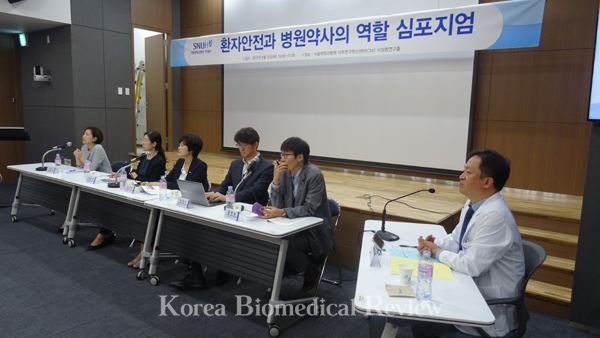Hospital pharmacists’ role to guarantee patient safety should be enhanced with systematic support, experts said.
Their comments came at a forum, held by the Pharmacy Department at the Seoul National University Hospital서울대병원 and the Public Healthcare Business Corps, on the topic of “patients safety and the roles of hospitals pharmacists” on Thursday.
In the forum, participants discussed the hospital pharmacists’ roles and institutional measures to enhance them, especially needed in a team treatment.

Professor Lee Joo-yun이주연 at college of medicine at Hanyang University pointed out hospital pharmacists have performed multidisciplinary treatments or drug safety check with low salary, urging a systematic approach.
“It is difficult to continue their works with small salary anymore. Because their roles are expanding in small hospitals as well, a systematic support is necessary. Whether they can contribute to patient safety in drug treatments is important,” Lee said.
“The U.S. and Japan guarantee medical costs when hospitals manage patients in their wards under the government’s support. Korea has to make a similar system to ensure patient safety. To make this public, universities have to educate safety measures.”
Lee Hyun-joo이현주, the professor at SNUH’s cardiothoracic surgery division, said drug monitoring should be available in real time and that the changes of patient conditions have to be reflected in their nutrition every day.
“Medical staffs and hospitals pharmacists need to do daily rounds and exchange opinions every day. In reality, it is difficult, but they understand the importance of the multidisciplinary approach. And hospitals expect pharmacist will play more roles in many areas,” Lee said.
Director Lee So-young이소영 at Health Insurance Review & Assessment Service (HIRA) said now is a right time to discuss the roles of hospitals pharmacists, in the academic and policy fields. But she said it would need much discussion about linking them to covering medical costs.
“Hospitals pharmacists have taken credits for their roles, but such credits haven’t been publicly acknowledged. They need to be considered as one of the medical services in multidisciplinary approach. We need more detailed work,” Lee said.
Professor Lee Kwang-woong이광웅 at SNUH’s surgery division also emphasized the necessity and importance of hospital pharmacists’ roles.
“Communication between hospital pharmacists and medical staffs is important. Doctors could know correct information about patients’ conditions and their treatments from pharmacists’ comments. Currently, we make multidisciplinary team rounds once a week with hospital pharmacists. Because they are well aware of the drug trend and prescription patterns of each doctor, they ask customized questions. This is important for patient safety. Consultation fee has to be raised,” said Lee.
“If the government doesn’t make the legal basis on medical cost-centered pharmacist activities, similar discussions will be repeated. I think the Ministry of Health and Welfare (MOHW) has to lay the legal ground to set medical costs to fit for the national health insurance,” said Kwon Kyung-hee권경희, the professor at College of Medicine at Dongguk University.
Kim Sang-kun김상건, the professor at College of Medicine at Seoul National University said it was important to clarify where the responsibility lies to guarantee drug safety.
“Even though pharmacists take part in the team treatments, a matter of responsibility is vague if a problem emerges in drug treatments. Covering medical insurance means taking the related responsibility and obligations. This is why we need a concrete system,” Kim said.

